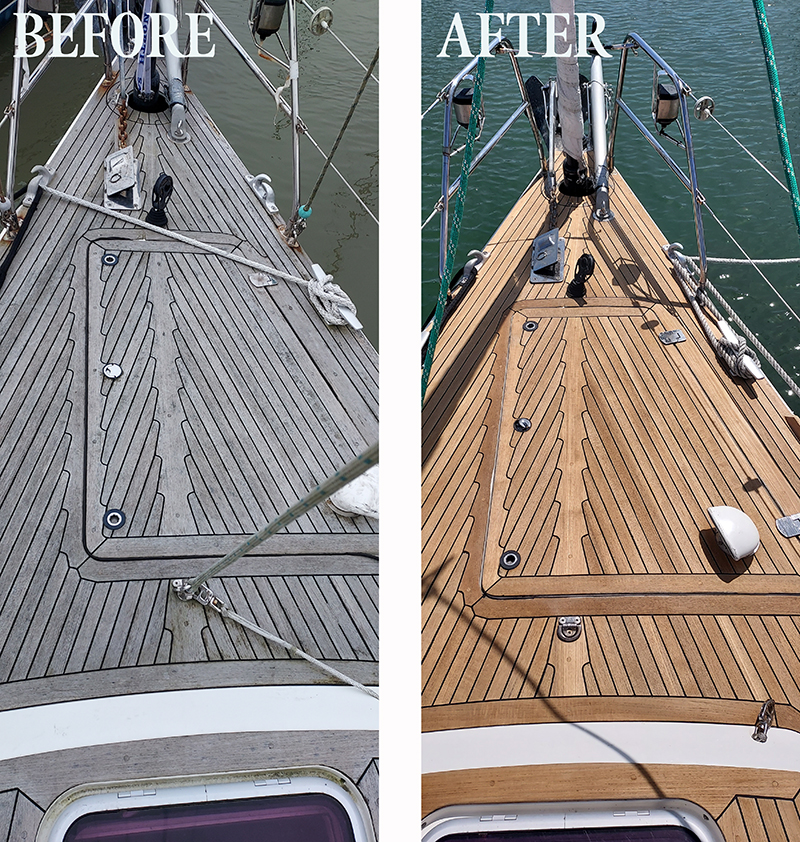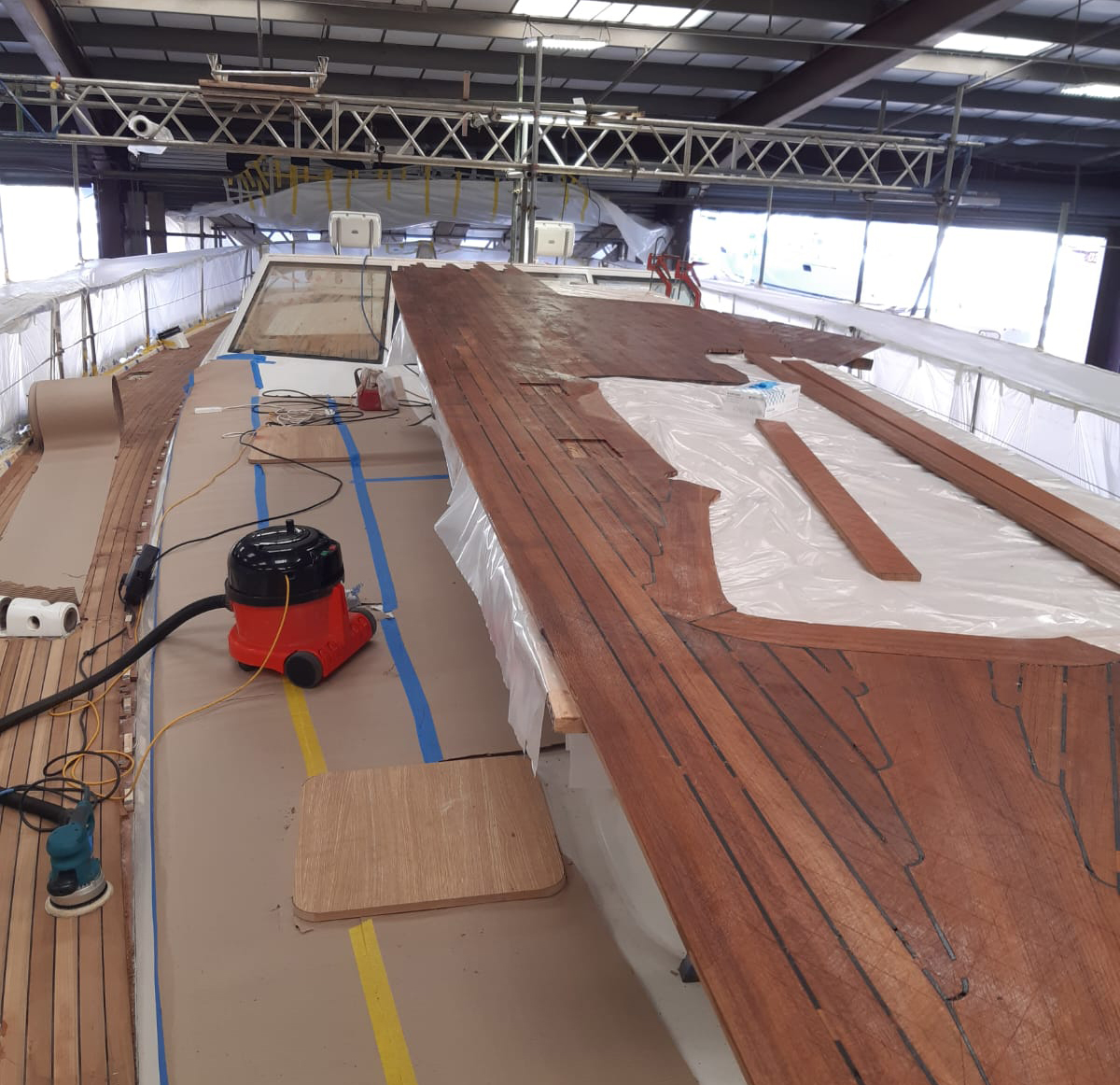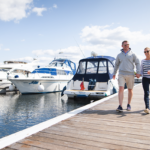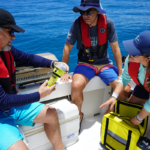 We speak to Paul Hardy at Ancasta Yacht Services about the alternative decking materials now available to boat owners considering an upgrade.
We speak to Paul Hardy at Ancasta Yacht Services about the alternative decking materials now available to boat owners considering an upgrade.
The deck of a yacht helps define its entire aesthetic. Colour, material and finish can dramatically alter a yacht’s look and feel – not to mention maintenance needs. Where once natural hardwoods dominated, today’s boat owners are increasingly choosing advanced, more sustainable synthetics. The shift reflects a renewed commitment to the eco-conscious principles that shaped early seafaring.
In centuries past, shipwrights preserved wooden decks with Stockholm tar, a pine-derived sealant that repelled water and extended a vessel’s life without harming the environment. Modern alternatives follow in this tradition, combining durability and style with environmental responsibility.
SYNTHETIC TEAK
Synthetic teak remains the most popular alternative to natural teak, offering the same warm aesthetic without the ecological cost of harvesting tropical hardwoods. Produced from PVC or composite materials, it is rot-proof, UV resistant and requires minimal maintenance – stains sit on the surface and can be removed with just soapy water.
Concerns over sustainability have led manufacturers to innovate. Flexiteek’s latest product, Flexiteek 3, uses bio-attributed PVC with up to 80 per cent fewer greenhouse gas emissions than conventional PVC. It is also fully recyclable, helping close the loop in a circular economy.
The material not only convincingly replicates teak’s natural grain but also comes in colours that reflect its natural ageing – from Bleached and Weathered to Ash and Scrubbed. Its advanced composition remains cooler underfoot, ensuring a more comfortable barefoot experience during hot summer days.
EVA FOAM
Lightweight and comfortable, EVA (Ethylene-Vinyl Acetate) foam decking is particularly popular for RIBs, fishing boats and watersports craft. Its soft, shock-absorbing surface is kind on joints and offers excellent grip.
The drawback is its environmental footprint: EVA is petroleum-derived and while technically recyclable, it is rarely processed, meaning much of it ends in landfill. Its long lifespan does offset the need for frequent replacement, but it remains a less sustainable choice.

CORK DECKING
Cork is emerging as a popular eco-friendly decking option. Harvested from the bark of cork oak trees – a renewable process that allows the tree to regenerate – cork is lightweight, shock-absorbent, heat-resistant and naturally non-slip. Cork forests also act as valuable carbon sinks, making the material doubly sustainable.
Cork decking is biodegradable and recyclable, though less durable than other options. For this reason, it is often better suited to low-traffic areas where comfort and environmental responsibility are priorities.
WOOD-PLASTIC COMPOSITE
WPC decking combines recycled wood fibres with polymers to produce a robust, low-maintenance surface. Resistant to UV damage and requiring little upkeep, WPC offers anti-slip properties and long service life.
However, it is heavier than most alternatives – potentially affecting performance on lighter boats – and it can retain heat, which reduces comfort in hotter climates. But for those prioritising longevity and easy care, it remains a strong contender.
EXTENDING THE LIFE OF TEAK
Replacing a teak deck is not always necessary as a worn deck can often be revived:
Cleaning & restoring: For light to moderate wear, regular treatment brings back the natural colour.
Sanding & repair: For more significant wear, sanding removes weathering and restores smoothness.
Re-caulking: Re-caulking the seams prevents leaks and refreshes the appearance.
Partial replacement: Small, isolated areas of damage can be addressed plank by plank.
Full replacement: If a deck wears below 4mm, a new surface – whether sustainably sourced teak or a modern alternative – will generally be needed.
PRACTICAL CONSIDERATIONS
The cost and timescale of a decking project depend on the location of the yacht and where it is stored – marina, yard, outside or undercover. Undertaking the work ashore and under cover avoids weather delays and reduces the need for plastic tenting, keeping costs and environmental impact down.
CHOOSING THE RIGHT OPTION
From the timeless appeal of teak to innovative synthetics and sustainable cork, yacht owners today have a wealth of choice. The decision comes down to balancing cost, appearance, maintenance and environmental impact. With technology advancing rapidly, the future promises even more versatile and sustainable materials – ensuring that the deck beneath your feet remains both functional and feel good.


















